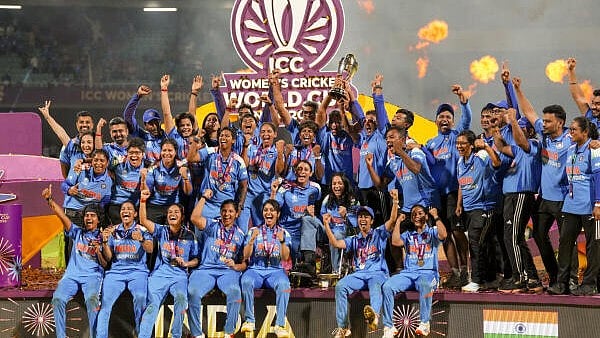
India’s players celebrate with the trophy during the presentation ceremony after winning the ICC Women's World Cup 2025, at the D Y Patil Stadium, in Navi Mumbai.
Credit: PTI Photo
For decades, women athletes have steadily shaped India’s sporting landscape for their gender. Sania Mirza brought tennis into the mainstream, proving that global success was achievable for women. Saina Nehwal and P V Sindhu revolutionised badminton, playing a big hand in turning it into India’s second-most popular game and inspiring a wave of young shuttlers. Meanwhile, MC Mary Kom carved her own extraordinary path in boxing, her medals across world championships and Olympics igniting nationwide interest in women’s boxing. Yet, amid these triumphs, that defining moment eluded Indian women’s cricket that would finally give it an identity distinct from its male counterpart’s dominance. The cricketers had come close to accomplishing it in 2005 and 2017, only to suffer heartbreaks. They were not to be denied their moment of glory on the third count. On Sunday night, in front of a raucous 40,000-plus crowd in Navi Mumbai and millions in front of their TV sets, Harmanpreet Kaur and her girls defeated South Africa by 52 runs in the final to win their maiden ODI World Cup, ending their long, painful wait for ICC silverware. This was the spark needed for women’s cricket, not just in India, but across the world. The victory has the potential to catapult the women’s game to unseen heights of popularity and prosperity, just as India’s triumphs in the 1983 World Cup and 2007 T20 World Cup changed the fortunes of the men’s game.
The results are already evident. The Smriti Mandhanas and Harmanpreet Kaurs were already household names, but this World Cup has brought to the fore lesser-known names and put them in the spotlight. While Bundelkhand pacer Kranti Goud and Andhra Pradesh spinner Shree Charani put their regions on the international map, the unsung Deepti Sharma finally earned her due. Shafali Verma, who was a last-minute replacement for the injured Pratika Rawal, turned the opportunity into history. Jemimah Rodrigues, the architect of the semifinal win over the mighty Australia, became the toast of the nation. Every player, from the veterans to the debutants, had her own inspiring tale to narrate, weaving together one of India’s greatest sporting sagas.
Amid these celebrations, it is vital to remember those who paved the way to this moment – from India’s first women’s captain, Shanta Rangaswamy, and all-rounder Diana Edulji to stalwarts such as Mithali Raj and Jhulan Goswami. Indian women’s cricket stands today on the foundation they built through years of dedication and belief. Accolades and rewards are pouring in, as everyone would want to have a piece of the fame that women cricketers are basking in. But let’s also remember, this is just the beginning.
